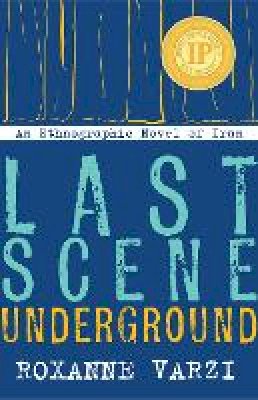Roxanne Varzi is a professor of anthropology and visual studies at the University of California, Irvine. She is the author of Warring Souls: Media, Martyrdom, and Youth in Post-Revolution Iran (2006). Her award-winning short stories have been published in a number of anthologies and magazines, including the New York Press. Her film, Plastic Flowers Never Die, has been shown in festivals around the world from Bosnia to Boston, and her sound installation, Whole World Blind, has been exhibited in galleries in San Francisco and Berlin and is featured on Public Books. Varzi was born in Tehran and left with her family shortly after the Revolution. In 2000, she was awarded the first Fulbright fellowship since the Islamic Revolution for research in Iran.
"Literary romance and ethnography are joined in perfect dialogue in Last Scene Underground. Roxanne Varzi has written a rare, powerful book that is both a whirlwind story of how it feels to be young and idealistic during the time of the Green Movement, and a pointed reckoning with the state of censorship in Iran today."—Nahid Rachlin, author of Persian Girls "This beautifully written book captures the predicament of every Iranian artist who is conflicted between one's own creative imagination, personal and social responsibilities, and political reality."—Shirin Neshat "Amazing and wonderful! Roxanne Varzi brings together her own Iranian heritage, excellent ethnographic research, and deep insights—all in a gripping read. In opening a new genre, the ethnographic novel, Varzi conveys the emotions, desires, creativity, and frustrations of so many young people in Iran."—Mary Elaine Hegland, author of Days of Revolution: Political Unrest in an Iranian Village "Last Scene Underground offers a thought-provoking and powerful story about our collective attempts to re-imagine the world. Writing with an inspiring combination of creativity and criticality, Roxanne Varzi has crafted an exceptionally memorable portrait of Iran, bringing both Tehran and its young people to life."—John L. Jackson, Jr., University of Pennsylvania "Varzi plays the role of what the anthropologist Renato Rosaldo has called a positioned observer, trying to make sense of life long after the ethnographer's duty of detailed description has been completed. Clifford Geertz has described creative ethnographers such as Varzi as novelists manqué, and she captures what I elsewhere have theorized as ethnographic surfeit. This surfeit is what remains after an ethnographer has paid dues to the science of empirical social knowledge. What is left is not quite hard data, but nonetheless an invaluable remainder of insight, affect, conversation, and emotion; an entire sensorium, which even if the ethnographer wants to, will not let her go."— Ather Zia, 3:AM Magazine

